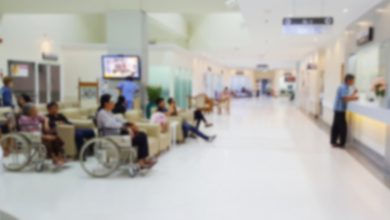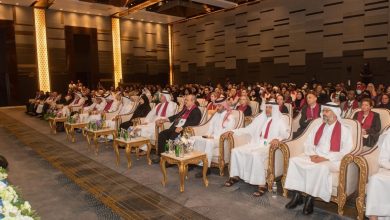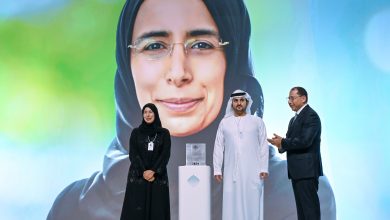
MOPH Announces Plan to Gradually Lift COVID-19 Restrictions
وزارة الصحة العامة تعلن تفاصيل خطة الرفع التدريجي لقيود كورونا
QNA
Doha: The Ministry of Public Health (MOPH) announced the details of the plan to gradually lift the restrictions imposed to limit the spread of coronavirus (COVID-19) over four phases with each phase lasting three weeks, as of May 28.
In a joint press conference with the Ministry of Commerce and Industry on Sunday evening, the MOPH said that the first phase of the plan for the gradual lifting of restrictions will start on May 28, it may start on May 23 if the public adhered to the health requirements during the blessed Eid Al Fitr and health indicators allow that. The second phase will start on June 18, the third on July 9, and the fourth on July 30.
Chair of the National Strategic Group on COVID-19 and Head of the Infectious Diseases Division at Hamad Medical Corporation Dr. Abdullatif Al Khal said that the start date of each stage and the decision on the period of its validity depends on the indicators of the pandemic, which in turn depends mainly on the extent of the public’s commitment to the current precautionary measures, the restrictions imposed and the directives issued by the competent government agencies, taking into account the potential increase in infections after the blessed Eid Al Fitr.
He added that this plan could be implemented on a state level or a particular region, in addition to fully and comprehensively assessing the situation before moving to any stage of the gradual lifting of restrictions.
Regarding the criteria for determining each stage, he explained that the first phase is a limited spread of the virus in society, the second is a low spread of the virus, the third is a simple spread, and the fourth stage is a non-spread of the virus, but rather sporadic infections.
The ministry decided to grant some privileges to those who received the two doses of COVID-19 vaccination. Dr. Abdullatif Al Khal said, “Unlike last year, we will be able to make more freedoms available to those people who are vaccinated where they will enjoy certain privileges before others.”
Dr. Al Khal listed the steps expected from lifting restrictions on places of shopping, work, prayers in mosques, attending restaurants and cafes, going to beauty salons, hair salons, gyms, health clubs, travel procedures, and other measures.
Speaking about the COVID-19 latest developments at the state level, Dr. Abdullatif Al Khal indicated that the number of deaths has decreased continuously since the implementation of the last package of restrictions on April 9, and these restrictions were imposed on March 26, stressing that these restrictions have proven effective in limiting the spread of the pandemic so far.
Dr. Al Khal showed several indicators that reflect the daily decline in COVID-19 cases over the past four weeks, adding that the weekly infection rate began to decrease, as the number of infections last week was 26.9 percent less compared to the previous week.
He added that infection in all age groups are declining after an increase in cases among children and adolescents in previous weeks, noting that the decline in infection cases was reflected in the number of acute infections requiring hospitalization, which recorded 176 cases last week, a 42.7 percent decrease compared to the week before.
Chair of the National Strategic Group on COVID-19 and Head of the Infectious Diseases Division at Hamad Medical Corporation Dr. Abdullatif Al Khal pointed to the decrease in the ICU admissions, which reached 77 cases last week, a decrease of 28 percent from the previous week.
He said that despite the decrease in COVID-19 infections, there is concern about an increase in the number of infections after the blessed Eid Al Fitr, similar to what happened during Eid Al Fitr and Eid Al Adha in 2020, indicating that the country witnessed two waves of infections that occurred immediately after the two Eid holidays.
Dr. Al Khal emphasized that the restrictions that were applied in the past four weeks, the increase in the frequency of vaccination, and the great community cooperation contributed to the continuous decrease in the number of daily cases, indicating that the decline reached less than 600 infections per day, compared to about 900 a month ago, coinciding with a decrease in the number of acute cases that require hospitalization and the number of deaths.
Dr. Al Khal explained that since mid-April, the total number of active COVID-19 cases, acute cases that were admitted to hospitals, and cases that require ICU admissions have witnessed a significant decrease.
He stated that the number of active cases has decreased by about 50 percent since mid-April, and the number of acute cases under treatment in hospitals has decreased by 35 percent, while the number of cases in ICU has decreased by 45 percent.
Dr. Al Khal hailed the society adherence to the requirements and controls set by the health authorities, adding that the results of this commitment were clear and evident, as it led to a decrease in all epidemiological indicators.
Caution is required because the country has not emerged from the second wave yet, as it is still facing two highly contagious and virulent strains of the virus spreading in society, he underlined.
During the first wave last year, the state witnessed an increase in infection and acute cases after Eid Al Fitr due to the failure of a segment of society to abide by the restrictions, precautionary measures, tips, and instructions that were imposed at that time, he explained. He warned that with the spread of new strains of the virus, it is possible to witness a similar increase in the number of cases during the coming weeks in the event of urgency in lifting restrictions and laxity in applying measures, as these strains are spreading much faster than the strains that spread during the last Eid holiday.
Dr. Al Khal called on all members of society to continue dealing seriously with restrictions and precautionary measures, and avoid social visits and meetings during the next few weeks to help the state control the epidemic and vaccinate a higher percentage of society.
Dr. Al Khal pointed out that, with the decline in societal cases, cases of infection among travelers returning from abroad now constitute a large percentage of the total cases recorded daily in the country, indicating that about 2 to 6 percent of travelers have positive test results during the first week of their arrival.
He explained that this rate is not considered abnormally high, as it corresponds to infection rates in many countries of the world, adding, “Although the number of new infections in the country continues to decrease, it is noticeable that the rates of infection with the virus around the world continue to rise generally.
Dr. Al Khal underscored that the quarantine policy applied in the State of Qatar for all people returning from abroad is one of the most stringent quarantine policies in the world, adding that this policy has proven its effectiveness in rapidly detecting and isolating the infected, which contributed to delaying the arrival of new strains of the virus to the Qatari society.
He added that all travelers coming to the State of Qatar must now undergo a COVID-19 test in one of the approved health centers in the country they come from within 72 hours before arriving in Qatar, pointing out that the test before arrival reduces the possibility of infections among arrivals but it does not completely prevent this, as some may be in the incubation period of the virus.
Dr. Al Khal also indicated that travelers are subject to re-examination to ensure that they are COVID-19 free before they leave the quarantine.
Chair of the National Strategic Group on COVID-19 and Head of the Infectious Diseases Division at Hamad Medical Corporation Dr. Abdullatif Al Khal confirmed that the State of Qatar has succeeded so far in limiting the effects of the second wave of the COVID-19 pandemic due to the government’s plans and the adherence of the public to them, as well as the huge turnout for the national program for vaccination against the virus, which exceeded expectations.
He added, “We must realize that it is too early to say that we have defeated the epidemic in light of the emergence of new mutated strains of the virus that are more capable of spreading than the original virus, in addition, the possibility of the virus returning to an outbreak again and an increase in the number of infected people still exists.”
Dr. Abdullatif Al Khal stressed that controlling the epidemic requires sacrificing some privileges and personal freedoms for a temporary period so that the state can vaccinate most of the population to prevent another wave from occurring. “We realize that many people are looking forward to lifting the precautionary restrictions imposed as soon as possible. However, we urge them to be patient so that we can control the epidemic more and vaccinate the largest possible proportion of the population,” he explained.
He pointed out that the State of Qatar, like the rest of the world, is gradually lifting the restrictions in several stages to ensure that a third wave of the virus does not occur, stressing that adherence to the restrictions and precautionary measures and acting responsibly will prevent the number of infected people from rising again, calling to continue adhering to the basic precautionary measures, including wearing a mask and maintaining physical and social distancing, avoiding crowded places, and getting the vaccine at the scheduled times.
Dr. Al Khal called on everyone to adhere to the precautionary measures even after receiving the vaccination until most of the country’s population gets this vaccine, warning that the implementation of these precautions will be more necessary during the coming days, especially during Eid Al Fitr.
Regarding fears of increasing numbers of infections, especially in front of the new strains that have appeared recently, he stressed that despite the decline in infection cases during the past days, there is fear of increasing numbers after the blessed Eid Al Fitr holiday, as happened last year, especially in light of the English and South African strains that are highly contagious and spread. He underlined the need to follow known precautionary measures and avoid visits as per the imposed restrictions.
Concerning the Indian strain, Dr. Al Khal said that it has not yet been clear that the Indian strain exists in Qatar, especially since those coming from abroad are subject to the hotel quarantine, and thus these cases are quarantined.
About the national vaccination program, Dr. Abdullatif Al Khal said that vaccination is one of the most important measures that will enable controlling the spread of the virus, explaining that the program is progressing at a rapid pace as more than 1.7 million doses of vaccines have been administered to community members to date.
Dr. Al Khal stated that about 50 percent of the population aged 16 years and over had received at least one dose of the vaccine, while 30 percent of them received the two doses, indicating that the MOPH continues to work to increase the pace of the vaccination program, as last week it was administered more than 180,000 doses of vaccines for community members in just seven days. He added that nearly nine out of every ten people over the age of 60, which is the group most at risk of disease, have received one dose of the vaccine so far, while nearly eight people out of every ten from this category have received the two doses.
Chair of the National Strategic Group on COVID-19 and Head of the Infectious Diseases Division at Hamad Medical Corporation Dr. Abdullatif Al Khal said that the State of Qatar is among the top ten countries in the world in the COVID-19 vaccination coverage compared to its population, stressing the need for vaccination for workers in the field of basic services to support the gradual lifting of restrictions.
To achieve this goal, the MOPH has established a unit to schedule vaccination appointments for workers in the field of basic services provided to the community, within the framework of the National COVID-19 Vaccination Program, he said.
The ministry provides support in vaccinating workers in various basic services in Qatar so that priority remains for workers who are in direct contact with community members, such as hairdressing and beauty salons, restaurants, grocery stores, supermarkets, hotels, and other hospitality facilities, he added.
He pointed out that the evidence and indications confirm the effectiveness of vaccines in protecting members of society from contracting symptoms of COVID-19 or becoming ill due to the virus.
Dr. Al Khal explained that statistics recorded until the end of April show that only one percent of cases admitted to ICU due to COVID-19 infection were for people who received two doses of the vaccine and that the probability of people who did not get vaccinated entering the ICU due to infection is 91 times higher than the fully vaccinated people.
He pointed out that a new research study in the State of Qatar showed that the two-dose vaccination, 14 days after receiving the second dose, is 89.5 percent effective in preventing infection with the British strain, and by 75 percent in preventing infection with the South African strain, which is very high, He explained that the study concluded that vaccination was 97.4 percent effective in preventing severe or critical illness or death in these two strains. He added that these statistics and results are very promising and give us optimism about the ability to return to normal life after vaccinating the majority of the population eligible for vaccination in Qatar, stressing that the vaccine has proven to be very safe, including for people who are allergic to some medicines, foods or other vaccines, as well as pregnant women.
Assistant Undersecretary for Trade Affairs at the Ministry of Commerce and Industry Saleh Al Khulaifi reviewed the gradual stages of lifting the restrictions, which will start on 23 or 28 May, according to the decrease in the number of infections after the Eid Al Fitr holiday, praising the commitment of shopping centers, markets, restaurants, cafes and business, and entertainment owners, with the precautionary and preventive measures taken by the state during the last period.
He noted that the State of Qatar is expanding the vaccination campaign to include workers in the field of services, as the concerned authorities will continue to vaccinate all workers and employees of companies, restaurants, and facilities to ensure the continuation of commercial activities and the gradual return to normalcy.
Al Khulaifi stressed the need for companies, commercial establishments, shopping centers, restaurants, and cafes to adhere to the restrictions and rates in the four stages of lifting restrictions, pointing out that the Ministry of Commerce and Industry, in cooperation with the concerned authorities, conducts intensive and continuous monitoring of the facilities’ compliance with the precautionary restrictions imposed and to ensure their compliance with the measures, procedures, and requirements of the MOPH to prevent the virus.
He added that after more than a year had passed since the pandemic, there is a greater understanding of the business owners of the main messages and precautionary measures that the state followed and that all employees of these activities became familiar with them, praising the good handling of these measures apart from some rare cases (violations) in which the necessary legal measures have been taken.
Assistant Undersecretary for Trade Affairs at the Ministry of Commerce and Industry urged those wishing to buy and shop during the Eid period, to use online services to avoid going out or to choose non-crowded shopping places while adhering to the complexes and markets procedures followed to maintain the safety of the visitors.
He noted that the MOPH is expanding its vaccination campaign by providing the vaccine to all workers in commercial and service companies and those dealing with the public directly by giving them a priority, as they will be contacted to vaccinate them before applying the stages of lifting restrictions so that they can provide the service safely.
قنا
الدوحة: أعلنت وزارة الصحة العامة تفاصيل خطة الرفع التدريجي للقيود المفروضة للحد من انتشار كورونا والتي تقرر أن تكون على 4 مراحل مدة كل منها 3 أسابيع تقريبا، وذلك اعتبارا من 28 مايو الجاري.
وأوضحت الوزارة خلال مؤتمر صحفي عقدته ليلة الأمس مع وزارة التجارة والصناعة، أن المرحلة الأولى من خطة الرفع التدريجي للقيود ستبدأ في 28 مايو الجاري ويمكن تقديمها إلى 23 من الشهر ذاته إذا تم الالتزام بالاشتراطات الصحية وخاصة خلال فترة عيد الفطر المبارك، وكانت المؤشرات الصحية تسمح بذلك، بينما تبدأ الثانية في 18 يونيو المقبل، والثالثة في 9 يوليو، والرابعة في 30 من الشهر ذاته.
وقال الدكتور عبداللطيف الخال رئيس المجموعة الاستراتيجية الوطنية للتصدي لفيروس كورونا (كوفيدـ19) ورئيس قسم الأمراض الانتقالية في مؤسسة حمد الطبية، إن تاريخ البدء في كل مرحلة واتخاذ القرار بشأن مدة سريان مفعولها يعتمد على مؤشرات الجائحة والتي تعتمد بدورها بشكل أساسي على مدى التزام الجمهور بالإجراءات الاحترازية الحالية والقيود المفروضة وبالتوجيهات الصادرة عن الجهات الحكومية المختصة مع الأخذ بعين الاعتبار الزيادة المحتملة في الإصابات بعد عيد الفطر المبارك.
ونوه إلى أنه يمكن تطبيق هذه الخطة على مستوى الدولة بأكملها أو على مستوى المنطقة بعينها، إلى جانب تقييم الوضع بشكل تام وشامل قبل الانتقال إلى أي مرحلة من مراحل الرفع التدريجي للقيود.
وعن معايير تحديد كل مرحلة، أوضح أن المرحلة الأولى يكون انتشار الفيروس محدودا في المجتمع، وفي الثانية يكون الانتشار منخفضا، والثالثة يكون بسيطا، بينما تتميز المرحلة الرابعة بعدم الانتشار للفيروس وإنما إصابات متفرقة.
وأكد الدكتور الخال أنه تقرر منح بعض الامتيازات لمن تلقى جرعتي التطعيم ضد (كوفيد-19).. وقال “على عكس ما حدث خلال العام الماضي سيكون بإمكاننا التخفيف من القيود ومنح هامش أكبر من الحرية والمزايا للأشخاص الذين تلقوا اللقاح ضد المرض بحيث يتمتعون دون غيرهم ببعض المزايا خلال المراحل المختلفة من رفع القيود”.
وسرد الدكتور الخال، الخطوات المتوقعة من رفع القيود والخاصة بأماكن التسوق والعمل والصلاة في المساجد وارتياد المطاعم والمقاهي والذهاب إلى الصالونات التجميلية وصالونات الحلاقة والصالات الرياضية والنوادي الصحية وإجراءات السفر، وغيرها من الإجراءات.
وفي معرض الحديث عن مستجدات الإصابات بكورونا على مستوى الدولة، أشار الدكتور عبداللطيف الخال إلى استمرار تسجيل انخفاض في عدد الوفيات منذ تطبيق حزمة القيود الأخيرة التي تم فرضها في 9 أبريل الماضي، وهي القيود التي فرضت بعد الحزمة التي فرضت في 26 مارس السابق له.. مؤكدا أن هذه القيود اثبتت فعاليتها في الحد من انتشار الوباء حتى الآن.
وعرض الدكتور الخال عددا من المؤشرات التي تعكس الانخفاض اليومي في حالات الإصابة بالفيروس على مدى الأسابيع الأربعة الماضية.. وقال إن معدل الإصابات الأسبوعي أخذ في الانخفاض، حيث كانت عدد الإصابات في الأسبوع الماضي أقل بنسبة 26.9 بالمئة مقارنة بالأسبوع السابق له.
وأضاف أن الإصابات في جميع الفئات العمرية آخذة في الانخفاض بعد ارتفاع في الإصابات لدى الأطفال والمراهقين في أسابيع سابقة.. مشيرا إلى أن تراجع حالات الإصابة انعكس على عدد حالات الإصابات الحادة التي تستدعي دخول المستشفيات التي سجلت 176 حالة في الأسبوع الماضي بانخفاض نسبته 42.7 بالمئة مقارنة بالأسبوع الذي سبقه.
كما أشار رئيس المجموعة الاستراتيجية الوطنية للتصدي لفيروس كورونا (كوفيدـ19) ورئيس قسم الأمراض الانتقالية في مؤسسة حمد الطبية في السياق ذاته، إلى انخفاض أعداد حالات دخول وحدات العناية المركزة، حيث تم إدخال 77 حالة الأسبوع الماضي، بانخفاض بواقع 28 بالمئة عن الأسبوع السابق له.
وقال إنه بالرغم من الانخفاض في الإصابات إلا أن هناك قلقا في زيادة عدد الإصابات بالفيروس بعد عيد الفطر المبارك، قياسا بما حدث خلال عيدي الفطر والأضحى في العام الماضي.. مشيرا إلى أن الدولة شهدت موجتين من الإصابات حدثتا بعد عطلتي العيدين مباشرة.
وأكد الدكتور الخال، أن القيود التي تم تطبيقها في الأسابيع الأربعة الماضية وزيادة وتيرة التطعيم والتعاون المجتمعي الكبير ساهمت في الانخفاض المستمر في عدد الإصابات اليومية بـ (كوفيد-19) المسجلة في الدولة.. مبينا أن التراجع وصل إلى أقل من 600 إصابة يوميا قياسا بحوالي 900 قبل شهر من الآن، مع تزامن ذلك تراجع عدد الحالات الحادة التي تتطلب دخول المستشفيات وكذلك في اعداد حالات الوفاة.
وأوضح الدكتور الخال، أنه منذ منتصف شهر أبريل الماضي، شهد العدد الإجمالي لحالات الإصابة النشطة بـ (كوفيد-19) وحالات الإصابة الحادة التي يتم إدخالها إلى المستشفيات والحالات التي تتطلب العناية المركزة انخفاضا ملحوظا.
وذكر أن عدد حالات الإصابات النشطة انخفضت بنحو 50 بالمئة منذ منتصف شهر أبريل، كما انخفض عدد الحالات الحادة تحت العلاج في المستشفيات بنسبة 35 بالمئة، بينما تراجع عدد حالات (كوفيد-19) بوحدات العناية المركزة بنسبة 45 بالمئة.
ونوه رئيس المجموعة الاستراتيجية الوطنية للتصدي لفيروس كورونا (كوفيدـ19) بالمساهمة المجتمعية من خلال الالتزام بالاشتراطات والضوابط التي حددتها الجهات الصحية.. وقال إن نتائج هذا الالتزام كانت واضحة وجلية، حيث أدت إلى انخفاض كافة المؤشرات الوبائية.
ونبه الدكتور الخال، إلى أن الوضع يتطلب المزيد من توخي الحذر.. وقال ” إن الحذر مطلوب كون الدولة لم تخرج من الموجة الثانية بعد، حيث ما تزال تواجه سلالتين شديدتي العدوى والضراوة من الفيروس تنتشران في المجتمع”.
وأضاف “لقد شهدنا خلال الموجة الأولى في العام الماضي ارتفاعا في الإصابة والحالات الحادة بعد عيد الفطر بسبب عدم التزام شريحة من المجتمع بالقيود التي كانت مفروضة والإجراءات الاحترازية والنصائح والإرشادات في ذلك الوقت”.. منبها إلى أنه مع انتشار السلالات الجديدة من الفيروس فإن من الممكن أن نشهد ارتفاعا مماثلا في عدد الحالات خلال الأسابيع المقبلة في حال الاستعجال في رفع القيود والتراخي في تطبيق الإجراءات، حيث إن هذه السلالات تنتشر أسرع بكثير من السلالات التي انتشرت في عطلة العيد الماضي”.
وطالب كافة أفراد المجتمع مواصلة التعامل بجدية مع القيود والإجراءات الاحترازية وتجنب الزيارات واللقاءات الاجتماعية خلال الأسابيع القليلة المقبلة حتى نتمكن من السيطرة على الوباء بشكل أكبر وحتى يتسنى للدولة تطعيم نسبة أعلى من المجتمع.
ولفت الدكتور الخال، إلى أنه مع انخفاض الحالات المجتمعية، أصبحت حالات الإصابة بين المسافرين العائدين من الخارج تشكل الآن نسبة كبيرة من إجمالي الحالات المسجلة يوميا في الدولة.. مبينا أن حوالي 2 إلى 6 بالمئة من المسافرين تكون نتائج فحوصاتهم إيجابية خلال الأيام السبعة الأولى من وصولهم.
وأوضح أن هذا المعدل لا يعد مرتفعا بشكل غير طبيعي، حيث إنه يتوافق مع معدلات الإصابة في الكثير من بلدان العالم.. مضيفا ” أنه بالرغم من أن عدد الإصابات الجديدة في الدولة يواصل الانخفاض إلا أنه من الملاحظ ان معدلات الإصابة بالفيروس حول العالم تواصل الارتفاع وذلك بشكل عام”.
وأكد أن سياسة الحجر الصحي المطبقة في دولة قطر لجميع الأشخاص العائدين من الخارج واحدة من أكثر سياسات الحجر الصحي صرامة في العالم.. وقال “أثبتت هذه السياسة فعاليتها في الكشف عن المصابين وعزلهم بشكل سريع، وهو ما أسهم في تأخير وصول السلالات الجديدة من الفيروس للمجتمع القطري”.
وأضاف أنه يتعين حاليا على جميع المسافرين القادمين إلى دولة قطر الخضوع لفحص (كوفيد-19) في أحد المراكز الصحية المعتمدة في الدولة التي يقدمون منها في غضون 72 ساعة قبل الوصول إلى قطر.. مشيرا إلى أن الفحص قبل القدوم يخفف من احتمال وجود إصابات بين القادمين إلا أنه لا يمنع ذلك بشكل تام حيث إن البعض قد يكون في فترة حضانة الفيروس.
كما أشار في هذا السياق إلى أن المسافرين يخضعون لإعادة الفحص للتأكد من خلوهم من (كوفيد-19) قبل خروجهم من الحجر الصحي.
وأكد الدكتور عبداللطيف الخال، أن دولة قطر نجحت حتى الآن في الحد من آثار الموجة الثانية من جائحة كورونا، نتيجة خطط الحكومة وتجاوب الجمهور معها، وتفاعله الكبير مع البرنامج الوطني للتطعيم ضد الفيروس والذي فاق ما كان متوقعا.
واستدرك قائلا ” يجب أن ندرك أنه من المبكر القول بأننا انتصرنا على الوباء في ظل ظهور السلالات الجديدة المتحورة من الفيروس التي تعد أكثر قدرة على الانتشار من الفيروس الأصلي، وأن احتمال عودة الفيروس إلى التفشي من جديد وارتفاع أعداد المصابين لا تزال قائمة”.
وشدد على أن السيطرة على الوباء تتطلب التضحية ببعض الامتيازات والحريات الشخصية لفترة مؤقتة حتى تتمكن الدولة من تطعيم معظم السكان لكي نمنع موجة أخرى من الحدوث.. مضيفا ” ندرك أن الكثير من الناس يتطلعون لرفع القيود الاحترازية المفروضة في أقرب وقت ممكن لكننا نرجو التحلي بالصبر حتى نستطيع السيطرة على الوباء بشكل أكبر وحتى يتسنى لنا تطعيم أكبر نسبة ممكنة من السكان”.
وأوضح أن دولة قطر تقوم كبقية دول العالم بالرفع التدريجي للقيود وعلى عدة مراحل لضمان عدم حدوث موجة ثالثة للفيروس، مؤكدا أن الالتزام بالقيود والإجراءات الاحترازية والتصرف بمسؤولية ستحول دون ارتفاع أعداد المصابين مرة أخرى ، داعيا إلى مواصلة الالتزام بالإجراءات الاحترازية الأساسية بما فيها ارتداء الكمامة والمحافظة على التباعد الجسدي والاجتماعي وتجنب الأماكن المزدحمة والحصول على اللقاح في المواعيد المقررة.
كما طالب الدكتور عبداللطيف الخال، الجميع بالالتزام بالإجراءات الاحترازية حتى بعد الحصول على التطعيم إلى حين حصول معظم سكان الدولة على هذا اللقاح.. منبها إلى أن تطبيق هذه الاحترازات سيكون أكثر ضرورة وبشكل أكبر خلال الأيام المقبلة لاسيما مع مناسبة عيد الفطر المبارك.
وعن المخاوف من تزايد أعداد الإصابات خاصة أمام السلالات الجديدة التي ظهرت مؤخرا، أكد أنه رغم تراجع حالات الإصابة خلال الأيام الماضية فهناك تخوف من تزايد الأعداد عقب إجازة عيد الفطر المبارك كما حدث العام الماضي، لا سيما في ظل السلالتين الإنجليزية والجنوب افريقية سريعتي العدوى والانتشار.. مشددا على ضرورة اتباع الإجراءات الاحترازية المعروفة وتجنب الزيارات خارج نظام القيود المفروضة.
وبشأن السلالة الهندية، قال الدكتور الخال إنه لم يتبين حتى الآن وجود السلالة الهندية في قطر خاصة وأن القادمين من الخارج يخضعون للحجر الفندقي وبالتالي يتم حصار هذه الحالات”.
وحول برنامج التطعيم الوطني، أوضح رئيس المجموعة الاستراتيجية الوطنية للتصدي لفيروس كورونا “كوفيد ـ 19” ورئيس قسم الأمراض الانتقالية في مؤسسة حمد الطبية، أن التطعيم يعد من أهم الإجراءات التي ستمكن من السيطرة على انتشار الفيروس ..موضحا أن البرنامج يتقدم بوتيرة سريعة حيث تم إعطاء أكثر من 1.7 مليون جرعة من اللقاحات لأفراد المجتمع حتى الآن.
وأفاد أن حوالي 50 بالمئة تقريبا من السكان في عمر 16 سنة فما فوق قد حصلوا على جرعة واحدة على الأقل من اللقاح .. بينما تلقى 30 بالمئة منهم الجرعتين.. مشيرا إلى وزارة الصحة العامة تواصل العمل لزيادة سرعة برنامج التطعيم حيث تم خلال الأسبوع الماضي إعطاء أكثر من 180 ألف جرعة من اللقاحات لأفراد المجتمع خلال سبعة أيام فقط ، مشيرا إلى أن ما يقرب من 9 أشخاص من كل عشرة فوق عمر 60 عاما وهي الفئة الأكثر عرضة لمخاطر المرض قد تلقوا حتى الآن جرعة واحدة من اللقاح، بينما حصل ما يقارب من 8 أشخاص من كل عشرة من هذه الفئة على الجرعتين.
وأكد الدكتور عبداللطيف الخال رئيس المجموعة الاستراتيجية الوطنية للتصدي لفيروس كورونا “كوفيد ـ 19” ورئيس قسم الأمراض الانتقالية في مؤسسة حمد الطبية، أن دولة قطر تندرج ضمن الدول العشر الأولى عالميا فيما يتعلق بالتغطية بالتطعيم ضد /كوفيد-19 / مقارنة بعدد سكانها.. مؤكدا ضرورة توفير الحماية للعاملين في مجال الخدمات الأساسية ضد كورونا لدعم عملية الرفع التدريجي للقيود.
وأضاف “من أجل تحقيق هذه الغاية قامت وزارة الصحة العامة بإنشاء وحدة لجدولة مواعيد تطعيم العاملين في مجال الخدمات الأساسية المقدمة للمجتمع وذلك في إطار البرنامج الوطني للتطعيم ضد فيروس كورونا /كوفيد-19/” ، حيث تقدم الدعم في تطعيم العاملين في مختلف الخدمات الأساسية في قطر، لتبقى الأولوية للعاملين الذين هم على اتصال مباشر مع أفراد المجتمع مثل صالونات الحلاقة والتجميل والمطاعم والبقالة والسوبرماركت والفنادق ومرافق الضيافة الأخرى”.. مؤكدا أنه تم تطعيم الآلاف من الموظفين والعاملين في هذه المجالات.
ولفت إلى أن الأدلة والمؤشرات تؤكد على فعالية اللقاحات في حماية أفراد المجتمع من الإصابة بأعراض /كوفيد-19 / أو الإصابة بحالة مرضية حادة بسبب الفيروس..قائلا “إن الإحصاءات المسجلة حتى نهاية ابريل الماضي تظهر أن واحدا بالمئة فقط من الحالات التي تم إدخالها للعناية المركزة بسبب الإصابة بكوفيد-19 كانت لأشخاص تلقوا جرعتي اللقاح، وأن احتمالية دخول أشخاص ممن لم يحصلوا على التطعيم إلى وحدات العناية المركزة بسبب الإصابة تزيد بمقدار 91 ضعفا عن الأشخاص الذين تلقوا التطعيم بجرعتين.
وأشار إلى ان دراسة بحثية جديدة بدولة قطر أظهرت أن التطعيم بالجرعتين، وبعد مرور 14 يوما من تلقي الجرعة الثانية، فعال بنسبة 89.5 بالمئة في الوقاية من العدوى بالسلالة البريطانية، وبنسبة 75 بالمئة في الوقاية من العدوى بالسلالة الجنوب الافريقية، وهي نسب مرتفعة جدا، منوها بأن الدراسة خلصت إلى فعالية التطعيم بنسبة 97.4 بالمئة في الوقاية من الإصابة بحالة مرضية شديدة أو حرجة أو الوفاة بهاتين السلالتين.. مضيفا أن هذه الإحصاءات والنتائج واعدة للغاية وتمنحنا التفاؤل بشأن قدرتنا على العودة إلى الحياة الطبيعية بعد تطعيم غالبية السكان المؤهلين للحصول على التطعيم في دولة قطر”، مؤكدا أن اللقاح أثبت أنه آمن للغاية بما في ذلك للأشخاص الذين لديهم حساسية من بعض الأدوية أو الأطعمة أو اللقاحات الأخرى وكذلك النساء الحوامل.
من جانبه استعرض السيد صالح الخليفي وكيل الوزارة المساعد لشؤون التجارة بوزارة التجارة والصناعة، مراحل رفع القيود التدريجية والتي ستبدأ يوم 23 أو يوم 28 مايو الجاري حسب انخفاض أعداد الإصابات عقب إجازة عيد الفطر المبارك.. مشيدا بالتزام مراكز التسوق والأسواق الشعبية والمطاعم والمقاهي وأصحاب الأنشطة التجارية والترفيهية بالإجراءات الاحترازية والوقائية التي اتخذتها الدولة خلال الفترة الماضية.
ونوه بأن دولة قطر تقوم بتوسيع حملة التطعيم لتشمل العاملين بمجال الخدمات حيث ستستمر الجهات المعنية بتطعيم جميع العاملين وموظفي الشركات والمطاعم والمرافق بما يضمن استمرار الأنشطة التجارية وعودة الحياة التدريجية لطبيعتها.
وأكد السيد صالح الخليفي على ضرورة التزام الشركات والمنشآت التجارية ومراكز التسوق والمطاعم والمقاهي بالقيود والنسب المفروضة المعلن عنها في المراحل الأربع لرفع القيود، لافتا إلى أن وزارة التجارة والصناعة بالتعاون مع الجهات المعنية تقوم بمراقبة مكثفة ومستمرة لالتزام المنشآت بالقيود الاحترازية المفروضة والتأكد من التزامها بالتدابير والإجراءات والاشتراطات التي وضعتها وزارة الصحة العامة للوقاية من الفيروس.
وأضاف أنه بعد مرور أكثر من عام على الجائحة كان هناك تفهم أكبر من أصحاب الأنشطة التجارية للرسائل الرئيسية والإجراءات الاحترازية التي اتبعتها الدولة وأصبح يعرفها كل موظفي هذه الأنشطة، مشيدا بالتعامل الجيد مع هذه الإجراءات بخلاف بعض الحالات النادرة (المخالفات) التي تم اتخاذ الإجراءات القانونية اللازمة حيالها.
وحث وكيل الوزارة المساعد لشؤون التجارية الراغبين في الشراء والتسوق خلال فترة العيد، على استخدام الخدمات الإلكترونية لتفادي الخروج، أو اختيار أماكن التسوق غير المزدحمة مع الالتزام بإجراءات المجمعات والأسواق المتبعة للحفاظ على سلامة المرتادين.
ونوه إلى أن وزارة الصحة تقوم بتوسيع حملتها للتطعيم من خلال توفير اللقاح لجميع العاملين في الشركات التجارية والخدمية والمتعاملين مع الجمهور بشكل مباشر وإعطائهم الأولوية، حيث سيتم التواصل معهم لتطعيمهم قبل تطبيق مراحل رفع القيود ليتمكنوا من تقديم الخدمة بشكل جيد.



